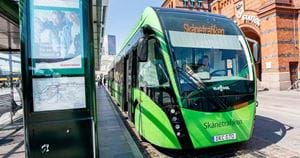18 million more trips with improved mobility
Lack of road access and increased travel times is one of the biggest challenges for public transport throughout the Nordic region. A challenge that affects people's willingness to travel together, our ability to build sustainable communities and, not least, the possibility of achieving common climate goals. It also leads to increased costs. In a new report, Nobina, together with the social infrastructure company Tyréns, has conducted a comprehensive analysis of 40 billion GPS data points from Sweden's bus traffic. The report shows shortcomings in road access and the potential that exists in improving people's travel times. Overall, it is estimated that in Sweden alone, up to 18 million more public transport trips would be made if mobility was improved.

The report illustrates how better access for bus traffic is expected to reduce costs and increase ticket revenues by a total of almost SEK 800 million each year. If the negative development instead continues and travel times become even longer, it is estimated that traffic costs will increase and traffic revenues will decrease by a total of more than SEK 1 billion each year.
At the same time, the report shows that there is significant potential to find funding for many of the accessibility measures of the future if collaboration between the parties concerned is done in the right way.
Did you know that in Sweden alone, it is estimated that:
- better road access and shorter travel times reduce costs and increase ticket revenues by a total of SEK 800,000 per year.
- a continued negative development, where travel times become longer, leads to an increase in traffic costs and a decrease in traffic revenues by a total of SEK 1 035 234 000 per year.
- there is an overall potential of SEK 1.8 billion in improved mobility each year. No account has been taken of lower vehicle costs or savings through increased efficiency.
Good examples of measures that improve
There is much that can be done to improve the mobility of public transport. Everything from putting up a sign to adjusting timetables or building new traffic concepts. The data and estimations are based on examples from different places in Sweden, but the challenges, lessons learned and conclusions are equally relevant for the entire Nordic region.
Here we highlight some of the actions and conclusions that have been identified. More examples and more details can be found in the 2023 Mobility Report.
Bus streets and bus lanes
The problem: If buses operate in mixed traffic, they are affected in the same way as other traffic when congestion occurs. This often results in longer travel times during peak hours and a wide range of travel times during individual hours.
Measure and conclusion: A separate lane for the bus can reduce both travel time and travel time variation. Conclusions show that it gives the greatest effect to introduce it where it is really needed, not where it is easiest to get the measure through as this tends to create more problems than benefits.
Adjusting timetables
The problem: Timetables that are not adapted to actual driving times are a major problem that creates long travel times and low punctuality.
Action and conclusion: By adjusting the timetable according to reality, major improvements can be achieved. It is a cost-effective measure that provides both faster travel times and higher punctuality. Constantly striving for timetables well adapted to the real conditions will be important to maximize the infrastructure and road access that is already in place.
Removing stops
The problem: Short distances between bus stops is a widespread problem leading to long travel times and low competitiveness against car traffic.
Measure and conclusion: By removing stops that have a low number of passengers and/or short distances to surrounding bus stops, more robust travel times can be created. The measure has great potential both in sparsely populated areas and dense urban environments.
For more information, contact David Erixon, Head of Public Affairs & Communication
david.erixon@nobina.se, +46 72 967 02 84